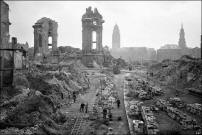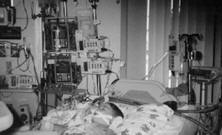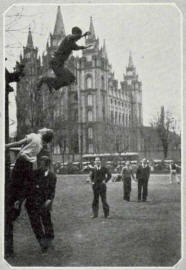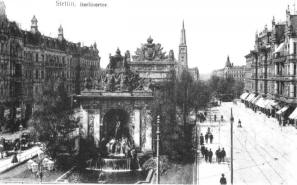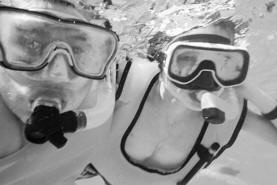Download: | pdf version | text version |
Chapter 9
(Salt Lake City, Utah, June 1, 1928)
Chapter 22
(Leipzig, Germany, November 1, 1990)
Chapter 24
(Portland, Oregon, August 24, 2001)
...
The shadow of the temple's spires jumps over the east wall, with Moroni's trumpet leading the charge across the deserted L.D.S. High campus. As City Hall's distant clock tower chimes, Temple Square, in turn, begins to find the shadows of soon-to-be skyscrapers along its perimeter encroaching on the summer evening's fading sunshine.
Though the sun is behind him and low in the sky, Hamp has to hold his hand up to block a gleam of reflected light as he snaps a photograph of his classmates clowning around in their graduation robes. The cranes on the horizon may be setting an accelerating pace for the new, boom economy, but Moroni still manages to glint starkly in the sinking sunlight, not quite ready to cede defeat to the encompassing skyline.
The last sliver of the setting sun slips over the mountains in the West Desert as the graduates pass through the open doors of the Tabernacle. The L.D.S. High seniors have seen their last sunset as high school students. The next sun rays will beam with them as proud graduates. It is certainly a night to remember!
...
“I, Jerry Jones,” Homer reads aloud, “bestow upon the underclassmen the right to date Betty, at least once in a while.”
They all break into hysterical laughter.
“And what did Betty leave?” asks Gordon.
Homer flips to the next page of the yearbook. “I, Betty Callister, leave for one good reason, and his initials are Jerry Jones.”
Their laughter resumes, almost drowning out the music. What a night it has been! Though the dawn will transform adolescence into adulthood, for now – for this one night – the worries of tomorrow will just have to wait until tomorrow comes. It is one of those rare occasions in which life seems to have culminated, yet still manages to promise an even brighter future. It is, without a doubt, the best of times.
As the dance floor fills to capacity, the four graduates stay seated in their circle, basking in the evening’s merry mood. They take turns flipping through the yearbook, each page bringing with it amusement, reflection, and a story from their fledgling yesteryouth. The twelve-piece band churns out song after song; then, all too soon, the music stops and the bandleader turns to face the crowd. The voices in the room dim in response.
“Thank you all for inviting us to celebrate with you tonight. We wish the night could go on forever, but unfortunately the clock has struck twelve and this will have to be our last number. We hope you return to your homes safely, and we wish each and every graduate all the best for the future.”
Cheers greet his words, then subside as the band plays the opening chords of the last number, a slow foxtrot. The end of the evening accelerates toward the four onlookers like ground-rush to a descending pilot. Suddenly and inevitably, their thoughts turn from the past to the overwhelming, open void of the future. They silently stare at the couples dancing the night away before them. Smirks and exchanged glances break the reflective tone, but not the silence, as Betty and Jerry pass in front of them on the dance floor, Betty methodically leading the steps: Slow, slow, quick, quick…slow, slow, quick quick…
Sitting silently to the side are the four wallflowers: Hampton and Homer, Rulon and Gordon…the tallest, the shortest, the smartest, and the boldest of the graduates. Mesmerized by the syncopated rhythm of the dancers’ steps, their eyes each follow a different couple’s trajectory across the crowded dance floor. Though dancing similar steps, each couple takes a completely different route; mostly they avoid one another, occasionally they gently brush up against one another, and in a few random instances, a mild collision takes place. Order and chaos are embodied in harmony here, and the intertwined motions are subtly symbolic of life’s unfolding saga ahead.
Not a word is spoken as they contemplate what the future might have in store for them. Are their paths destined to cross again? Will they be readily remembered or forever forgotten? These questions just barely begin to surface in their minds, but their imaginations – no matter how vivid – surely lack the capacity to picture how the answers might be fulfilled. If a voice from the future were to whisper to them in that instant even just a hint of things to come – the amazing sights they will see as witnesses to the changing tide of history, the influence they will bear on millions upon millions of people, the manner in which they, quite literally, will change the world – they would scarcely believe it. What little do they know…
~~~~~~~~
...
The immense train station was surreal, a window into a hundred years of tumultuous history. Twenty-two sets of tracks hit a dead end in Leipzig's Hauptbahnhof, more than in any other German terminal. We came to a jolting halt outside the station; the chain reaction of compressed couplings resonated through the cars like a wave of dominoes as the electric locomotive reversed direction. I opened the window and peered out to watch the darkness under the approaching arch swallow the rear cars of the train. The high-pitched squeal of the brakes contrasted with the deep, almost inaudible, German voice echoing over the loudspeaker: “Train 173 from Dresden, now arriving on Track 4.”
Despite the station’s immensity, my car near the front of the train was left protruding out in the open, unprotected from the chill wind. I closed the window and made my way down the aisle with my luggage bouncing off the seatbacks. I tossed my garment bag out the door and onto the platform, then backed my way down the steps; my oversize suitcase nearly knocked me over as I awkwardly dragged it down the steps while trying to brace it with my knees. The cold seeping in from every angle drove in the realization that my new trench coat was going to be horribly inadequate for the next two winters. I turned to face the station, took my bags in hand, and drew a deep breath. “Well then, Elder Price,” I mumbled aloud, “let’s see what you’ve got…”
The deep breath had been a mistake: I started coughing up soot before I could even finish the sentence. The thick, sulfurous discharge from ten thousand coal-heated buildings burned my eyes and throat as I made my way forward into the station. My arms were quickly tiring, but the tiny wheels on my suitcase were of no use on the rough surface, so I kept moving with one arm outstretched, holding my garment bag as a counterbalance to keep the heavier suitcase just barely off the ground. My flat-soled shoes provided little traction on the frosty asphalt, and my cautious gait drew a few quizzical glances from the fellow passengers who passed me by.
The backlight on the acrid haze made the station appear completely dark inside. I squinted as I approached the main atrium; a few rays of light found their way through the soot-blackened skylights. My eyes gradually adjusted to the dim interior.
Time may as well have stood still for a century or more in the Leipzig station. I was curious to see a Deutsche Reichsbahn-era steam engine on the track beside me, but it didn’t seem a bit out of place in this setting. The old steam engine must have had quite a history, I thought, puffing its way around Europe for so many decades. Looking around at the masonry walls of the station, I noticed light, grouted pockmarks contrasting with the darkened sandstone blocks of the support columns – telltale scars of war deliberately left untended by the 40-year regime that had collapsed less than a year before. It seemed odd to me that the soot didn’t stick to the grout like it did to the sandstone.
I checked my watch and pulled out my planner to make sure I had made it on time to the designated meeting spot near the main steps. No sooner had I set down my luggage on the steps, than a spry, elderly gentleman approached me. He looked at my nametag and extended his hand.
“Elder Price?” he said.
“Yes.” I answered. I began to apologize that he would be stuck with a greenie still learning the ropes.
He wasn’t listening. “Elder Price,” he said again, very slowly this time, staring at my nametag.
“Yes!” I answered again.
“Elder Price,” he said once again, even more slowly, with his brow curled in deep thought.
This time I didn’t respond, but rather waited for an explanation of his odd behavior.
He tapped on my nametag. “You know,” he said, “when I was a full-time missionary many years ago, I had a companion named Price. We used to call him Hamp. I know it’s a big place over there across the pond, but is there any relation?”
“Of course,” I answered, “he’s my grandfather!”
“Well what do you know?” he said, “I’m Elder Schreiter! Your grandfather called me Herbie.” A smile emerged on his wrinkled face. “To think that I’d be serving with Hamp’s grandson sixty years later!” he added, “We’ll have lots to talk about on the bus.”
...
As we made our rounds visiting the scattered church members over the following days, I had trouble keeping the new faces and places straight. An old widow named Frau Kurokpa, though, stood out in particular. As it turned out, she had also known my grandfather back in the day. During our visit with her, she had excused herself to rummage through some boxes, returning with a black and white photograph of a group of missionaries.
“Turn it over,” she said.
On the back of the photo was an inscription written by my grandfather. I read it aloud and was struck by his optimistic tone.
“We were all young and idealistic back then,” Frau Kuropka added with a sigh, “Perhaps things might have been different in another world...well, you might as well have that photo for yourself.”
I nodded appreciatively and put the photograph into my bible as she started into the dreadful fate of her husband and the close-knit group of friends my grandfather had once known.
While some hope of peace still remained at the time the photograph was taken, she related, they all had recognized that the world was drifting toward war. Sure enough, not long after the photograph was taken, the American missionaries had been forced to flee the spreading conflagration. If it indeed came to war, they had decided before parting ways with their German counterparts at the harbor, they would refuse to fight each other.
The German missionaries were eventually conscripted by the Nazi war machine; the pact, however, was not forgotten. Having chosen the much more deadly eastern front, most of these young German Saints never came back from Operation Barbarossa, Hitler’s failed attempt to conquer the Reds. To this day it remains the largest military conflict of all time, and Frau Kuropka’s new husband was one of the unfortunate souls swallowed up in the slaughter. She had pieced together his final moments from the scattered accounts of the few survivors who returned.
...
(Tatsinskaya, Russia, December 23, 1942)
A few days before Christmas in 1942, Corporal Kuropka lay shivering in a shallow pit, having frantically tried to dig a foxhole into the frozen ground with the butt of his now defunct Karabiner rifle. His only warmth came from the blood that dripped from shrapnel wounds inside his stiff uniform. His head was ringing wildly; he was nearly deaf from the percussive explosions. His own spent cartridges littered the snow around him. Under constant fire in a frozen wasteland, he finally resorted to a vain attempt at concealment from the approaching enemy, using his empty magazine to scoop snow over himself.
Meager rations had weakened his body ever since his Army Group’s supply line had been cut off weeks before. He faced a constant struggle between fatigue and any remaining survival instinct he could muster. It was a losing battle; for deep inside, he knew there was no hope of reinforcements. The shells finally stopped exploding overhead in a misleading respite; the brief silence signaled to the approaching Red Army troops that the German positions had been softened sufficiently for an infantry charge.
Rifle shots began to echo through the charred tree stumps as thousands of Soviet troops tightened their noose around the stranded, dazed, and purposeless German army battalion. Many of the Russians had initially stormed into battle as cannon fodder, without a weapon of their own, driven by relentless officers, primordial fear, and a powerful propaganda machine that had instilled a pervading eye-for-an-eye mentality. Some had managed to snatch a rifle from a fallen comrade and pressed forward. Having been dragged into this war against their will, they were motivated by rage and the added incentive of well-placed snipers on their own side who had been ordered to shoot them if they retreated. A commandant who placed that little value on individual life within his own ranks was never going to value his enemy’s life enough to spare it at the sight of a white flag or raised hands.
The redundant order to “take no prisoners” had already been standard operating procedure by the time it made its way down from the top in this chapter of the conflict. In dealing with the surrounded enemy soldiers, the only question for the officers in command was whether they could spare a bullet or whether an old-fashioned bayonet would have to do. To the Russians, with their munitions factories in shambles but with an endless stream of peasants joining the ranks, infantry soldiers were replaceable; bullets were not. Because bayonets were messy, risky, and bad for the troop’s morale, however, for this assault the commanders opted for bullets, on the condition that shots be conserved until they could be fired with deadly accuracy at point-blank range. The Russian soldiers obeyed their orders to wait until the last moment; then, seeing the proverbial whites of their eyes, they fired at the cowering enemy soldiers without hesitation.
A hopeless sense of despair overcame the corporal. As the gunshots rang ever closer, he knew that these were not just random shots fired toward the horizon; each represented a fallen countryman. The tattered German army awaited its doom; not a shred of the pride that had swept through their rallies a few years earlier remained in their hearts. Their world had been completely overturned, their hopes replaced with the deepest shame and regret. Their fathers had found themselves in a similar quagmire a generation before when – unexpectedly and unbelievably – a Christmas truce was called. This time, however, there would be no troops in opposing trenches singing Silent Night together in a ceasefire. This battle, sadly, wouldn’t break for the holidays.
The young newlywed’s short existence fed his mind memories and expectations. What of the life he had imagined with his new bride? How had that promising destiny jumped the tracks and plunged down this awful chasm? Convulsing with fear, he removed his gloves and put his fingers – blackened from frostbite – together in a fervent prayer. His prayer gave way to a dream in which he saw himself entering his little apartment in Stettin, embracing his wife on Christmas Eve. He lit the candles on the advent wreath, felt the warmth of the hearth, smelled the Christmas tree’s boughs, heard the sound of familiar carols, and tasted the savory, home-cooked meal. His diverted senses were at home, and in the snow, his arms crossed around his weakening body and squeezed tightly. In his heart and in his mind – with every emotion his soul could stir up – he embraced his wife and hung on for dear life. Through his tears, he tried to picture their unborn children opening presents one day at the foot of the tree: chocolates, a nutcracker, or perhaps a hand-carved manger scene. It was a vision of what might have been; it was – devastatingly – the last dream he ever had.
Frau Kuropka’s eyes silently related the end of the tale, unalleviated by the passage of time. The single bullet that had ended her husband's dream hundreds of miles away had in the very same instant sentenced this unwitting widow to fifty years of loneliness. We shook our heads in silence, unable to think of any words that would do justice to the moment.
I stared at her framed photographs of old Stettin, Breslau, Danzig, and Koenigsberg – cities adorned in their earlier splendor that had since been leveled to the ground and stripped of their German population. This lonely old widow was nearing the end of her days in a meager box of an apartment. The other families in her little congregation were now thriving, while her line would end with her death. Having lived a life of blatant comfort, I had come waltzing back into her world speaking of my grandfather: her friend who had become part of the force that her husband had been unwilling to fight. Her fifty years as a widow had begun with that practically suicidal pact. Had it all been worth it? Though further questions and doubts raced through my mind, the burdened look in Frau Kuropka’s eyes rendered my questions entirely inappropriate; I held my tongue and bade her farewell.
...
I struggled to make sense of the pact, but in the end, to me it came to represent one small fragment of meaning in an otherwise meaningless conflict. Twentieth-century warfare had left Germany with four million widows, many of whose husbands had died for hatred, bigotry, fear, or pride. Here was one widow whose husband had deliberately died for love. He had come to love those who had come to serve among his people – my late grandfather among them – and in the end, he would not break his vow, come what may...
~~~~~~~~
...
“Grab the paddles,” the attending physician shouted, “Stat!”
The defibrillator instantly appeared from a hatch in the wall, and a fully staffed medical team in scrubs descended on our little recovery room within seconds of the heart monitor’s alarm bell. The technician at the controls of the pacemaker tried time and again to make the pulsating blips catch the rapidly accelerating waves before time ran out. It looked like a harmless video game on the pixilated, green screen, but the look on his face as he frantically turned the dial revealed that this was no game – this was deadly serious. 100 beats per minute had turned to 150, then to 200. Fibrillation had set in. The readout showed 250 beats a minute and climbing; by this time, it was obvious that Jaedin’s heart couldn’t possibly be circulating any blood to his extremities. Again and again, the electrical pulses – controlled by a dial in the medic’s hands – tried to catch the rapidly accelerating rhythm of Jaedin’s heartbeat to coax it back to a safe pulse. By the time it hit 300 we knew we had only seconds before brain damage, a coma, and then a fatal collapse.
Moments before, we had been sitting at his bedside in relative privacy, absolutely exhausted but able to relax for the time being with a complex open heart surgery just behind us. We were finally breathing a sigh of relief when the alarm had sounded. Now we stood on the sidelines as the ER team scurried around, each member playing his part; we as the parents, on the other hand, had no role at all to play. We had been reduced to mere distractions; our only job was to stay out of the way. We couldn’t even hold our little boy's hand or stroke his head. It was an awful, helpless feeling. All we could do was hope and pray for a miracle.
At that point, we knew full well that Jaedin’s life was entirely in God’s hands…and in the hands of some stranger with his fingers on the dial of a machine that I didn’t understand in the least. We prayed that God’s hands might guide the hands of this stranger – a man we had first laid eyes on a few seconds before, but who had now become to us the most important stranger on the planet. We knew that every second was absolutely crucial. The fibrillation continued, and they readied the paddles. It was like a scene out of a prime-time emergency room drama. I pictured Jaedin's little body reacting to the pulse. I could only imagine from what I had seen on television the effect a jolt of electricity would have on him.
Thankfully, the pacemaker caught up to his heart at the very last instant and managed to gradually slow the rhythm, eliminating the need for the paddles. After a few more minutes, the attending physician pronounced the exercise a success. They shoved the defibrillator back into the hatch, took off their masks, and clocked out. They went home to their families and in all likelihood had nothing new to report from this uneventful shift; it was all in a day’s work for them. I, on the other hand, had been permanently affected by those agonizing few minutes. The fear, the uncertainty, and the harrowing helplessness were indescribable...
...
(Cozumel, Mexico, January 28, 2008)
I carried Jaedin down to the cabin, and he fell asleep in my arms; he was still dressed in his tuxedo after having dined with the captain. In the course of a week, courtesy of the Make-a-Wish Foundation, he had climbed ruins, rafted rivers, snorkeled reefs, pet dolphins, and even sat in the captain’s chair at the helm of the world’s largest passenger ship – over 200 feet longer than RMS Titanic herself!
I helped him out of his bowtie and jacket, laid him into his bunk, and turned off the light. Waves crashed outside the porthole as the ship steadily rode the swells; the sea foam – illuminated by the ship’s lights – followed the drifting wake to be handed over to the dimmer moonlight. On the horizon, thousands of breaking wave crests could be seen stretching across the vast sea. There was just enough light through the porthole to make the deep, zipper scar on Jaedin’s chest clearly visible; it was a distinct reminder of years that had focused on survival and recovery.
“What a week!” I said to Jaedin as he rolled over, “We’ve got a lot to be thankful for.”
He opened his eyes. “Especially that there are no icebergs in the Caribbean,” he added with a smile, and then quickly drifted back to sleep...
~~~~~~~~
Download: | pdf version | text version |
